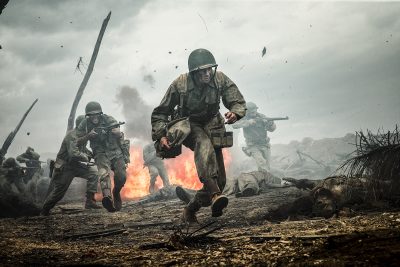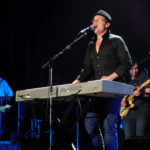
Dramatic, gory and thrilling would be apt descriptions of Mel Gibson’s new film “Hacksaw Ridge.” Yet, the film still falls short of spectacular. While “Hacksaw Ridge” has universal themes and a twisted narrative that make it enjoyable and unique, it doesn’t quite stand out from the crowd.
The film, based on a true story, revolves around the life of Desmond Doss (Andrew Garfield), a medic who served during the Battle of Okinawa during World War II and was awarded the Medal of Honor for leading 75 men to safety, without firing a single shot.
Doss, a religious and pacifistic man, chose to join the army because he thought it was his patriotic duty to. Yet he refused to engage in combat or even handle a rifle. The concept of a peaceful man placed into a war zone is one wrinkle that manages to capture the audience’s attention.
Something that doesn’t, however, is Doss’ character. He is portrayed as morally righteous, pacifistic, brave, loving and a model human being. In other words, too perfect.
It is hard to find fault in Doss’ heroic character, expect that at times he seems too prideful or stubborn. An example would be when he would rather be sent to prison for refusing to pick up a rifle when commanded to by an officer rather than simply go against his morals.
Yet this pride struggle is rendered pointless when Doss’ father, who served in World War I, barges into the courtroom during his son’s trial with a letter declaring his son has the constitutional right to object to hold a firearm during war.
While Doss’ character may be underwritten, Garfield’s performance is still an excellent one that captures the character’s awkwardness, steadfast beliefs and bravery.
Overall, the acting in the film is solid, as supporting performances from Teresa Palmer as Doss’ wife and Hugo Weaving as his alcoholic father help to shore up the film.
Religion plays an important role in the narrative of “Hacksaw Ridge,” so much so that religion becomes the narrative.
The film is structured as a descent from heaven to hell. We begin in a heavenly, sparkling small town in Virginia where we are introduced to Doss as his relationship to Dorothy, his future wife, is kindled. We then move to purgatory, or basic training, where Doss’ values are questioned and his body is broken before finally settling into the dark, hellish pit that is war.
Doss’ character also bare striking resemblance to Jesus himself. He has strong beliefs and refuses to back down when they are questioned, is a healer both spiritually and physically (even curing one soldier of blindness), and at the end of the film Doss is carried away on a stretcher with one hand out to his side and the other tucking a Bible close to his chest, as the camera pans upwards toward the heavens.
While the religious structure woven into the film is interesting, it can be easy to miss. Thinking about the structure basically, it’s the same as almost any war film: young man decides he wants to fight in war, endures suffering through basic training and even more suffering during war.
But the clichés do not stop there. On Doss’ first day of basic training, he and his company are degraded by a loud-mouth commanding officer, a scene nearly identical to that of the iconic Stanley Kubrick film “Full Metal Jacket.”
There are more predictable moments, like when Doss and his basic training enemy, a rough meathead named Smitty (Luke Bracey), put aside their differences to become friends, or when Doss saves the Sergeant who called him a coward from a near-death experience during battle.
The battles scenes are well directed and clearly capture the tragedy of war. But because it strives for high-drama moments such as slow motion shots of bombs exploding and dramatic music, the film does not create the realism that places the audience in the heat of battle as a film like “Saving Private Ryan” does.
But while “Hacksaw Ridge” may fall victim to a few clichés, it still manages to succeed in being a good film through uplifting, accessible themes.
Doss is the classic underdog who goes bravely into a world where he is not welcome, sticking to his principles, even when they are under attack, and selflessly puts his life at risk to save those who doubted him. And in the end, he earns the respect of his peers that he deserved since the beginning of the film.
The message of “Hacksaw Ridge” is that true bravery is not about how many punches you throw, but rather from how you respond when what you value most is under attack. In the case of Doss, pacifism was his display of bravery.




